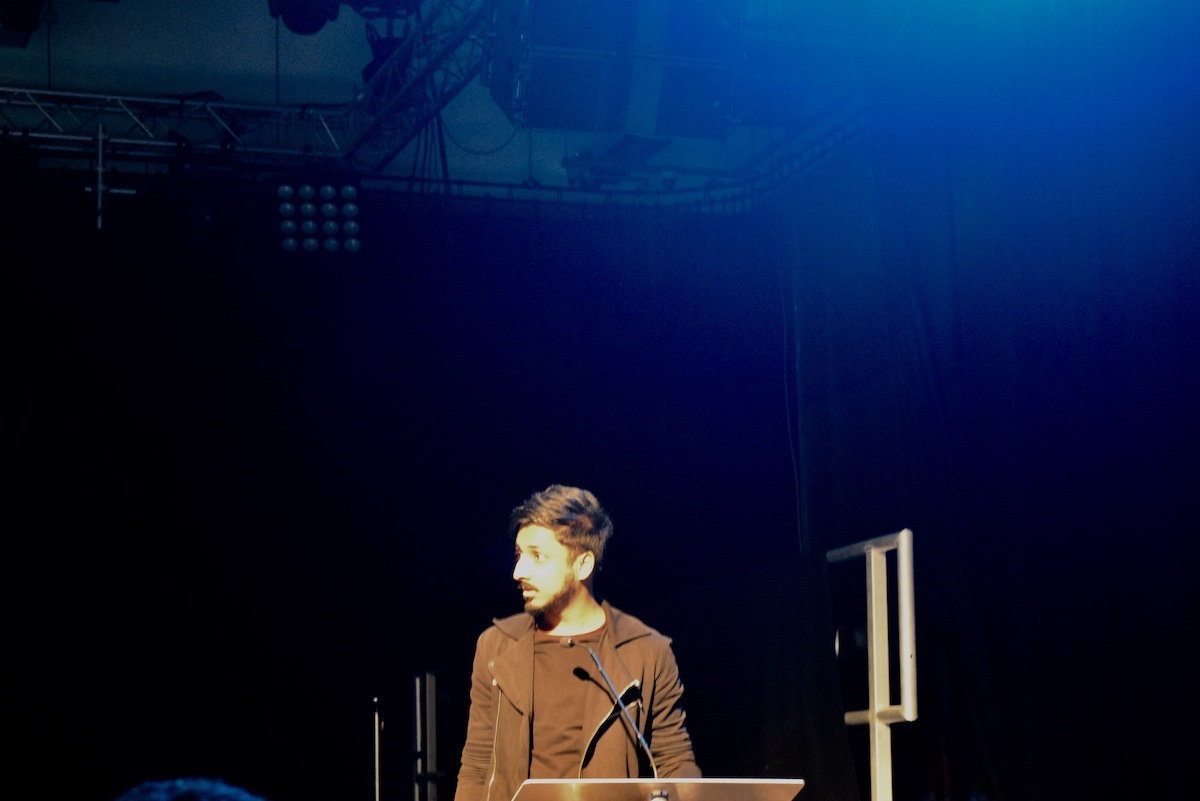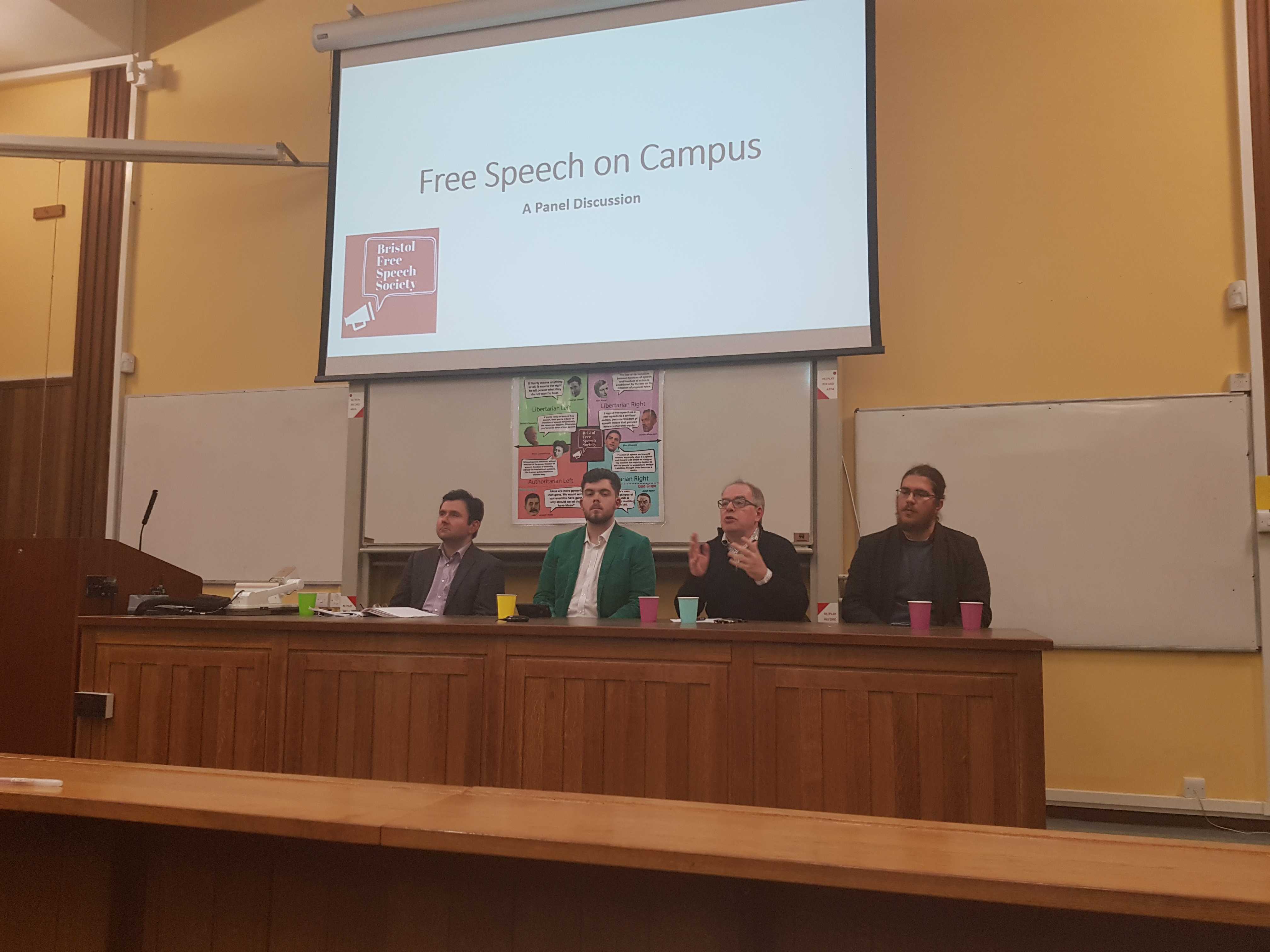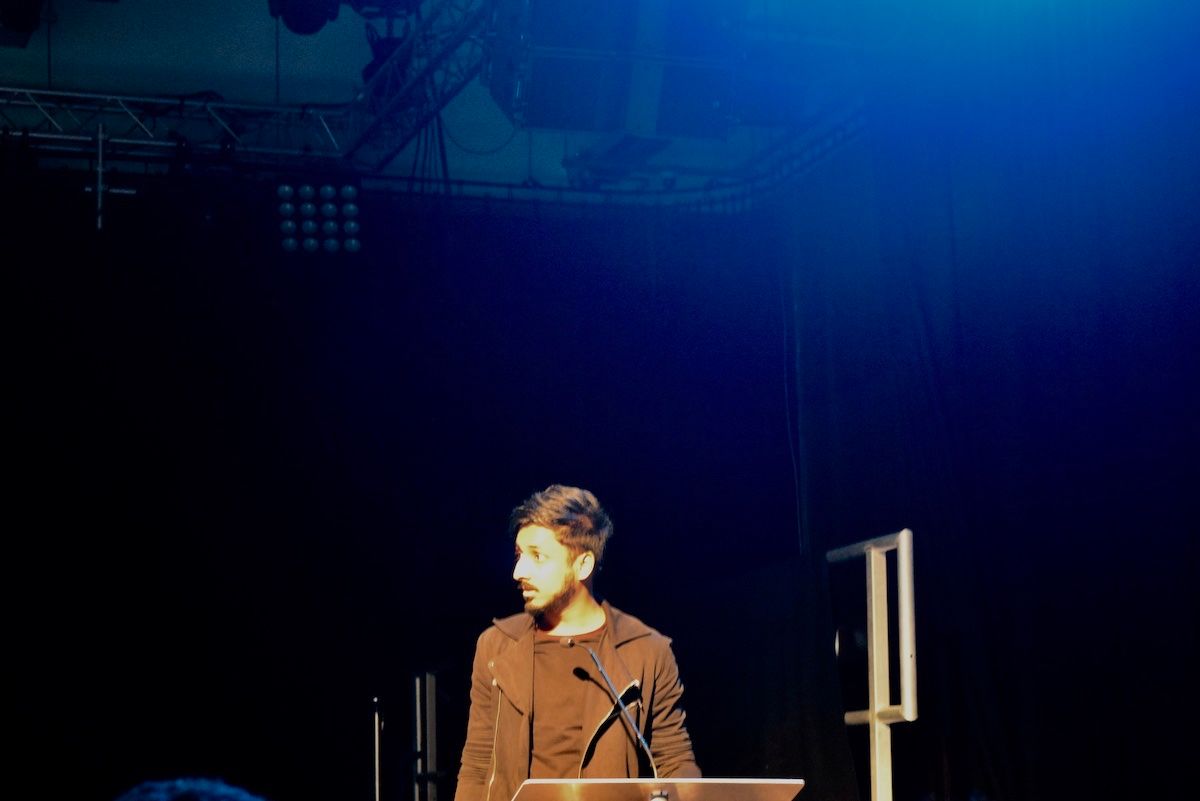By Tom Taylor, Deputy Features Editor
Following an AMM motion asking the Students Union to reaffirm their support of freedom of speech, Epigram Features examines whether freedom of speech really needs protecting at our University.
On Tuesday, the Students Union Annual Members Meeting heard a motion which declared that the Union should ‘make clear their commitment to the Freedom of Speech Code of Practice 2017/18 and ensure that their practice is compliant.’
The motion asked the Union to reaffirm their stance in favour of freedom of speech and referenced a Joint Committee on Human Rights report into the status of freedom of speech on UK university campuses. The report, the motion argued, ‘found several barriers were present, including intolerant attitudes to speech often incorrectly using the banner of “no platforming” and “safe space” policies’ as well as ‘incidents of unacceptable and intimidatory behaviour by protestors.’

Sunil Singh talks to the AMM | Image: Epigram / Tom Taylor
After a brief debate, the motion failed to pass. One of its proposers, Sunil Singh, told me afterwards that he felt ‘disappointed’ in the vote and felt that this motion ‘would have been a good way for the Students Union to show students who are worried about freedom of speech that they were acting in alignment with their principles.’
Before leaving the meeting, I asked Sunil whether he would consider trying again at the next AMM. He said he would discuss it with the committee and a few students who were sitting around us nodded.
Sunil is the treasurer of the University of Bristol Free Speech Society, a Union affiliated society which claims to ‘protect freedom of expression on campus’ and cites a ‘recent trend of restrictions across university campuses in Britain and America’.
'Isolated incidents of intimidation and disruptive protest, often perpetrated by non-students, are held up as representative of the university environment as a whole.'
But does freedom of speech really need protecting at Bristol University?
Isolated incidents of intimidation and disruptive protest, often perpetrated by non-students, are held up as representative of the university environment as a whole. The widely reported protests at Jacob Rees-Mogg’s UWE speech in February 2018, were ‘caused by outsiders, rather than students or the university itself’, the parliamentary report stated.
Language and discourse from the American right and alt-right is used to glue these incidents together into a re-tweetable narrative of the “intolerant left”. The result is an artificially constructed problem which does very little to reflect the reality of university education in the UK. The Free Speech Society responded to this accusation by arguing that ‘the reason why language and discourse crosses over the Atlantic is because much of the Western world is facing similar challenges.’

Students exercise democracy at the AMM | Image: Epigram / Tom Taylor
Nasra Ayub, Undergraduate Education Officer at Bristol Students Union, asked Sunil whether he was creating a problem which doesn’t actually exist. She told me that ‘The recent Joint Committee Report on Freedom of Speech’, cited in the original motion, also ‘suggested that media coverage has implied that there is more censorship of debate in universities than actually takes place, and this is something I would agree with.’
The Joint Committee’s report argued that whilst there are a number of factors limiting free speech such as ‘intolerant attitudes’, ‘unacceptable intimadatory behaviour’ and ‘fear and confusion over the Prevent duty’, the ‘extent to which students restrict free speech at universities should not be exaggerated.’
The report stated that ‘The evidence we have taken shows that overall there is support for the principle of freedom of speech among the student population’ and admits that ‘much of the concern about free speech appears to have come from a small number of incidents which have been widely reported (and those reports are often repeated)’.
'The extent to which students restrict free speech at universities should not be exaggerated'
Joint Committee on Human Rights Report
A representative from the University Conservative Association told me that ‘freedom of speech is still relatively widespread’ and that ‘it’s very hard to get a speaker’s invitation rescinded here luckily, as a society we have had no problems with our guests.’ The Association does, however, worry that ‘more radical elements of student politics are trying to gain control of SUs and decide who does and doesn’t speak’.
Why then, if threats to freedom of speech at universities are not a ‘pervasive issue’, do groups claiming to ‘protect’ freedom of speech frequently spring up at Bristol University? In March 2016, ex-editor of the Bristol Tab and Bristol University alumnus Conrad Young set up a non-Union affiliated free speech group called Bristol Against Censorship.

Bristol Free Speech Society's panel discussion | Image: Epigram / Ed Southgate
Conrad tells me the group was ‘created to help highlight issues of censorship on campus’ and provide a ‘place for discussion’. As it gained traction online, ‘it became more of a pressure groups’, he says, and ‘national publications came to us for comment many times.’ He also set up a public discussion page, where members post media reports and discuss them.
The Free Speech Society informed me that they were founded ‘in response to a motion targeted at de-platforming trans-exclusionary radical feminist (TERF) speakers and was vague enough that any controversial speaker could subsequently be barred from speaking.’
I attended the meeting where this motion was heard last year and remember the atmosphere growing incredibly heated, with one of the opponents, who is now president of the Free Speech Society, stopped mid-speech because he breached the code of conduct.
A spokesperson for the University Bristol Green Society remembered this heated debate when I asked them for their thoughts on free speech. ‘I personally believe’, the spokesperson told me, ‘that free speech ends when you openly debate the humanity of a person which infringes on their fundamental human right to exist.’
We're here @Bristol_SU's Annual Members' Meeting tonight! pic.twitter.com/CB2Vy105ZB
— Epigram (@EpigramPaper) February 26, 2019
Clearly, some students at Bristol feel like free speech is under attack. A Liberal Democrats Society spokesperson argued that ‘recent cases of no platforming and the debate around the practice has shown a real conflict between the role of our universities as places of debate and learning and their duty of care to students.’ In reference to the recent Angelos Sofocleous controversy and last year’s TERF motion, the spokesmen stated that ‘free speech is testing all universities and recent events have shown that Bristol is no different.’
Yet the reality of students’ ability to express themselves freely at Bristol University does not warrant such concern. Bristol SU have stated that they have ‘not refused a platform to any speaker in the last few years’ and follow the University’s Freedom of Speech Code of Practice which claims that the only exception to freedom of speech on campus ‘is where there are serious concerns about public disorder or the direct incitement of violence or hatred.’
Bristol SU has not refused @Sofocleous_A as a speaker. Bristol SU is committed to freedom of speech and the rights of all our students to discuss difficult and sensitive topics.
— Bristol SU (@Bristol_SU) February 11, 2019
The causes of the disparity between perception and reality are multi-faceted and numerous and I do not claim to have all the answers. Nevertheless, sensationalised media coverage clearly plays a role. When controversial incidents and protests do occur, they are quickly picked up on by media outlets because they are usually dramatic and make for an exciting story.
The Free Speech Society’s discussion group, which can be viewed openly by non-members, is a prime example of this. The group is a stream of such articles, posted by members for discussion, and acts as an echo-chamber and amplifier for the “intolerant university” narrative.
Featured Image: Tom Taylor
Do you agree with the author? Let us know by following the links below.








